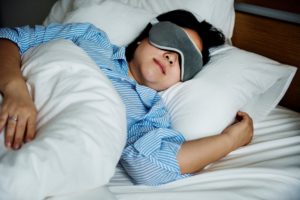What Are Precognitive (Premonition) Dreams?
Because most humans dream for at least two hours each night , it’s no surprise you might have a few vivid dreams or unsettling dreams in your life. You may even be among the 17.8% to 38% of people who have experienced at least one precognitive or premonition dream. These are dreams that seemingly predict the future .
Dreams must meet several criteria to be classified as precognitive:
- You must record or tell others about your dream before the dream scenario is fulfilled in real life.
- The dream must have a significant number of unique details so that it is unlikely to be fulfilled by chance.
- Any dreams that are self-fulfilling prophecies or that could be influenced by existing knowledge are not premonition dreams.
- Dream telepathy, or communication with others via dreams, cannot influence the premonition dream.
Is Your Troubled Sleep a Health Risk?
A variety of issues can cause problems sleeping. Answer three questions to understand if it’s a concern you should worry about.
Can Dreams Predict the Future?
At this time there is little scientific evidence suggesting that dreams can predict the future. Some research suggests that certain types of dreams may help predict the onset of illness or mental decline in the dream, however. For example, in people with Parkinson’s disease, dreams containing negative emotions are correlated with future cognitive decline .
Different stages of life and experiences can alter your dreams and cause nightmares. Pregnancy can lead to more nightmares or vivid dreams. Trauma can also impact your sleep, and both trauma and mental issues are associated with an increase in nightmares . In turn, nightmares may negatively affect your sleep overall.
In some circumstances, you might have a lucid dream. While lucid dreams do not predict the future, they give you an awareness that you are dreaming. You may even be able to control your dream while lucid dreaming .

Instances in Which Dreams Have Been Premonitions
Some historical events were reportedly predicted through dreams. Because these events occurred in the past, there is no method for verifying that the dreams met the criteria for precognitive dreams.
Abraham Lincoln’s Assassination
President Abraham Lincoln reportedly dreamed of his own death . Lincoln’s friend and law partner, Ward Hill Lamon, later described the dream as Lincoln recounted it to him.
Lincoln dreamed of people sobbing, and in his dream, he went to investigate. In the East Room of the White House, he found a corpse dressed for a funeral. Lincoln asked the figures in the dream what happened. One reported to him that the president was assassinated. In reporting this dream to Lamon, Lincoln appeared disturbed and frightened.
Later, Lincoln clarified the dream to Lamon. The president assassinated in his dream was not Lincoln himself, but some other president. This was the dream he had just nights before his assassination on April 14, 1865.
A different potentially predictive dream Lincoln frequently experienced was more positive. He saw Union ships pursuing a damaged enemy ship. He also saw Union soldiers with a higher ground, ready to take victory. Lincoln reportedly had this dream right before days of historical importance, such as the battles at Antietam and Gettysburg, and he interpreted it as a good omen.
Aberfan Landslide
In 1966, a landslide of waste from a coal mine slid into the South Wales village of Aberfan. The local school was destroyed by the landslide, killing 144 students and teachers.
A British psychiatrist, John Barker, came to the village shortly after the landslide. Barker was researching what happens to people when they believe they’re about to die. He collected 76 accounts of premonitions of the Aberfan landslide, 60 of which he followed up on.
A notable premonition was submitted by the parents of Eryl Mai, a 10-year-old girl killed in the accident. The day before the accident, the child had reported to her mother a frightening dream. She had dreamed that her school was no longer there and that it had been covered by “something black.”
Robert Kennedy’s Assassination
Robert Kennedy’s assassination was potentially predicted by a person’s dream. Two of the people who submitted premonitions of the Aberfan landslide to British psychiatrist John Barker kept reporting accurate psychic dreams in the following years. They submitted these to a newspaper column, called the Premonitions Bureau.
In March of 1968, Kathleen Middleton reported her first premonition of an assassination of Robert Kennedy. She continued to dream of Kennedy’s death for months. On June 4, 1968, she called the Premonitions Bureau three times, urgently concerned about Kennedy. He was shot just after midnight the next day, on June 5, 1968.
Possible Explanations for Precognitive Dreams
Researchers have proposed a number of possible explanations for precognitive dreams.
Selective Recall: People recall confirmed premonition dreams significantly more frequently than disconfirmed premonition dreams. In other words, if your dream predicts the future, you are much more likely to remember that dream than your dreams that did not accurately predict the future.
Tolerance for Ambiguity: Some dreamers interpret ambiguous dreams as positive or desirable. Researchers call this “tolerance for ambiguity.” People with a high tolerance for ambiguity are more likely to experience premonition dreams.
Paranormal Beliefs: Researchers have found a significant relationship between belief in the paranormal, belief in precognitive dreams, and the ability to make associations among unrelated events. These results suggest that if you’re inclined to find connections in the world, you’re more likely to experience premonitions.
Coincidence: Some people who have precognitive dreams may not interpret them as predictive until a corresponding event occurs in real life. Factors such as selective recall, tolerance for ambiguity, and paranormal beliefs can contribute to you drawing connections between coincidences in your life and dreams you’ve experienced.
Subconscious Connections: Experts hypothesize we dream to process our memories and emotions . As a result, events that you experience during the day may stick with your subconscious. For example, you might dream of purchasing new furniture for your home. When you wake up, you see an advertisement for a couch you want to purchase. However, if you had been thinking about redecorating your home and researching furniture for a few days, your dream might simply reflect what was already coming up in your life.
The Future of Precognitive Dreams
The existence of predictive dreaming may never be proven or disproven by science. Instead, researchers can study larger samples of people who experience premonition dreams to get a bigger picture of who has them and how they are caused.

Still have questions? Ask our community!
Join our Sleep Care Community — a trusted hub of product specialists, sleep health professionals, and people just like you. Whether you’re searching for the perfect mattress or need expert sleep advice, we’ve got you covered. Get personalized guidance from the experts who know sleep best.
References
11 Sources
-
National Institute of Neurological Disorders and Stroke. (2019, August 13). Brain basics: Understanding sleep., Retrieved June 9, 2021, from
https://www.ninds.nih.gov/health-information/public-education/brain-basics/brain-basics-understanding-sleep -
Lange, R., Schredl, M., & Houran, J. (2000). What precognitive dreams are made of: The nonlinear dynamics of tolerance of ambiguity, dream recall, and paranormal belief. Dynamic Psychology: An International Interdisciplinary Journal of Complex Mental Processes.
https://goertzel.org/dynapsyc/2000/Precog%20Dreams.htm -
Valášek, M., Watt, C., Hutton, J., Neill, R., Nuttall, R., & Renwick, G. (2014). Testing the implicit processing hypothesis of precognitive dream experience. Consciousness and Cognition, 28, 113–125.
https://pubmed.ncbi.nlm.nih.gov/25062119/ -
Bugalho, P., Ladeira, F., Barbosa, R., Marto, J. P., Borbinha, C., Salavisa, M., Conceição, L., Saraiva, M., Fernandes, M., & Meira, B. (2020). Do dreams tell the future? Dream content as a predictor of cognitive deterioration in Parkinson’s disease. Journal of Sleep Research, 30(3), e13163.
https://pubmed.ncbi.nlm.nih.gov/32776436/ -
Lara-Carrasco, J., Simard, V., Saint-Onge, K., Lamoureux-Tremblay, & Nielsen, T. (2014). Disturbed dreaming during the third trimester of pregnancy. Sleep Medicine, 15(6), 694–700.
https://pubmed.ncbi.nlm.nih.gov/24780135/ -
Rek, S., Sheaves, B., & Freeman, D. (2017). Nightmares in the general population: Identifying potential causal factors. Social Psychiatry and Psychiatric Epidemiology, 52(9), 1123–1133.
https://pubmed.ncbi.nlm.nih.gov/28712041/ -
Baird, B., Mota-Rolim, S. A., & Dresler, M. (2019). The cognitive neuroscience of lucid dreaming. Neuroscience and Biobehavioral Reviews, 100, 305–323.
https://pubmed.ncbi.nlm.nih.gov/30880167/ -
Lamon, W. H. (1994). Recollections of Abraham Lincoln 1847–1865. Nebraska Press.
-
Knight, S. (2019, June 25). The psychiatrist who believed people could tell the future. The New Yorker., Retrieved June 11, 2021, from
https://www.newyorker.com/magazine/2019/03/04/the-psychiatrist-who-believed-people-could-tell-the-future -
Watt, C., Ashley, N., Gillett, J., Halewood, M., & Hanson, R. (2014). Psychological factors in precognitive dream experiences: The role of paranormal belief, selective recall and propensity to find correspondences. International Journal of Dream Research, 7(1), 1–8.
https://journals.ub.uni-heidelberg.de/index.php/IJoDR/article/view/11218 -
Scarpelli, S., Bartolacci, C., D’Atri, A., Gorgoni, M., & De Gennaro, L. (2019). Mental sleep activity and disturbing dreams in the lifespan. International Journal of Environmental Research and Public Health, 16(19), 3658.
https://pubmed.ncbi.nlm.nih.gov/31569467/

















